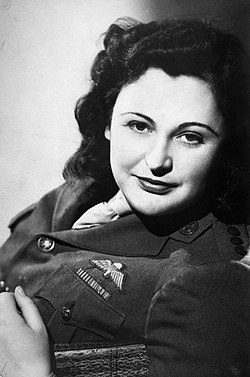Allied WWII spy Nancy Wake dies aged 98
Tuesday, August 9, 2011

Nancy Wake, a spy the German Gestapo nicknamed "The White Mouse" during WWII because of her evasion of them and who once topped their most-wanted list, has died. She passed away Sunday while hospitalised in London within days of turning 99.
Born in New Zealand, she was raised in Australia but ran away when she was sixteen. By the 1930s she was a journalist in Paris when, in 1933, she took a trip to Austria to witness Nazi crimes against Jews. After interviewing Adolf Hitler, she chose to dedicate herself to being a thorn in his side. "In Vienna they had a big wheel and they had the Jews tied to it, and the stormtroopers were there, whipping them. When we were going out of Vienna they took our photos. That was my experience of Hitler," she later said.
| I used to think it didn't matter if I died, because without freedom there was no point in living | ||
—Nancy Wake | ||
France surrendered to the Nazis in 1940, with Wake and her rich husband, businessman Henri Fiocca, joining the Resistance of the German occupiers. The duo helped fleeing soldiers and Jews in their journeys to Spain, with Wake's roles including spy, courier, and saboteur.
Her husband convinced her to flee to the UK in 1943; upon arrival in England she joined British Special Operations. Wake and Fiocca never met again. The following year she parachuted back into France to give Resistance fighters a weapons delivery, but only found out after the nation's subsequent liberation that Fiocca had been captured by the Gestapo. They tortured and killed him through his defiance: he refused to give up his wife.
The most decorated Australian servicewoman - and one of the most decorated among the Allies - Wake's honours included the Legion D'Honneur (France's highest award), the UK's George Medal, the US Medal of Freedom, and being made a Companion of the Order of Australia.
Wake made her way back to Australia in 1949 and failed in repeated attempts to be elected to parliament. Since 1957 she has lived in England, married to ex-UK Royal Air Force pilot John Forward. She has been in a veterans' retirement home since 2003.
"Nancy Wake was a woman of exceptional courage and resourcefulness whose daring exploits saved the lives of hundreds of Allied personnel and helped bring the Nazi occupation of France to an end," Australian PM Julia Gillard said in tribute, calling her "a devastatingly effective saboteur and spy". Warren Truss, leader of the Australian National Party, called her exploits "the stuff of legend." "[A]ll Australians feel very proud of this wonderful woman," he said.
New Zealand's Veterans' Affairs Minister Judith Collins shared the sentiment, calling Wake "a woman of exceptional courage and tenacity, who cast aside all regard for her own safety and put the cause of freedom first". Wake's stance on freedom was clear: "Freedom is the only thing worth living for," she said after the war. "While I was doing that work, I used to think it didn't matter if I died, because without freedom there was no point in living."
Her story inspired Charlotte Gray by author Sebastian Faulks, later made into the movie of the same name. Wake retained pride in her work; "I have only one thing to say: I killed a lot of Germans, and I am only sorry I didn't kill more," she would later say of her fighting.
Sources
- "Australia WWII heroine Nancy 'White Mouse' Wake dies" — BBC News Online, August 8, 2011
- Madeleine Coorey. "Great Australian WWII heroine dies at 98 in London" — Agence France-Presse, August 8, 2011

